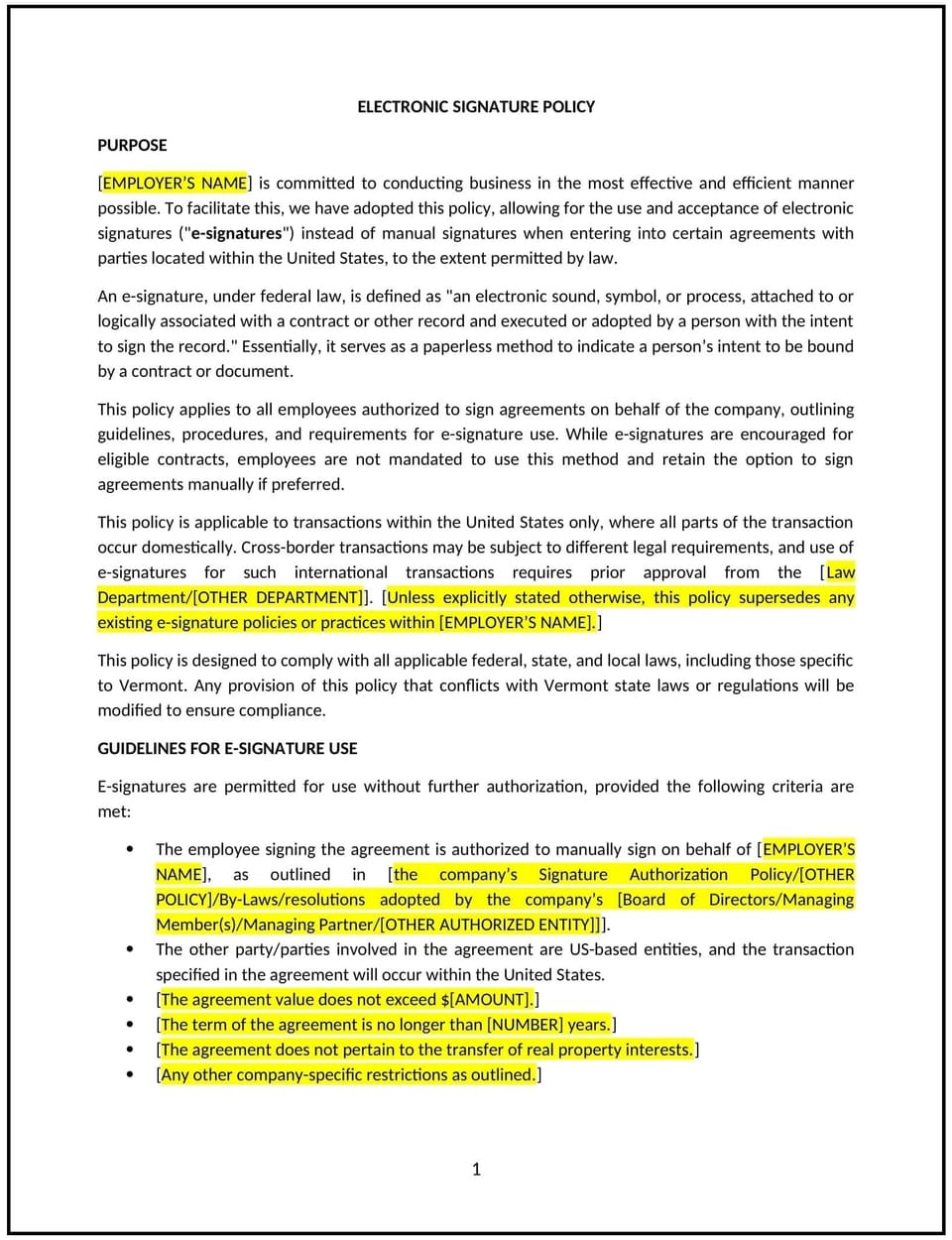Electronic signature policy (Vermont): Free template

Electronic signature policy (Vermont)
This electronic signature policy is designed to help Vermont businesses adopt and manage the use of electronic signatures for official documents. It outlines guidelines for promoting legal compliance, data security, and the validity of electronically signed agreements in accordance with Vermont and federal laws, including the Electronic Signatures in Global and National Commerce (E-SIGN) Act and Vermont's Uniform Electronic Transactions Act (UETA).
By adopting this policy, businesses can streamline document workflows, enhance efficiency, and reduce reliance on paper processes.
How to use this electronic signature policy (Vermont)
- Define electronic signatures: Specify what constitutes an electronic signature, such as typed names, digital signatures, or other electronic methods of indicating agreement.
- Establish permitted uses: Detail the types of documents or transactions eligible for electronic signatures, such as contracts, agreements, or internal approvals.
- Outline authentication requirements: Include measures for verifying the identity of signers, such as email verification, unique access codes, or multi-factor authentication.
- Address security protocols: Specify data encryption and storage requirements to protect signed documents and prevent unauthorized access.
- Include retention guidelines: Provide instructions for storing electronically signed documents in compliance with Vermont laws and company recordkeeping policies.
- Clarify legal enforceability: State that electronic signatures hold the same validity and enforceability as handwritten signatures under applicable laws.
- Monitor compliance: Regularly review practices to ensure alignment with Vermont laws and industry standards for electronic transactions.
Benefits of using this electronic signature policy (Vermont)
This policy provides several benefits for Vermont businesses:
- Enhances efficiency: Streamlines document approval and execution processes.
- Reduces costs: Minimizes expenses related to paper, printing, and physical storage.
- Promotes compliance: Aligns with Vermont and federal laws governing electronic signatures.
- Improves security: Protects sensitive information through encryption and secure storage.
- Supports sustainability: Reduces paper usage and contributes to environmentally friendly practices.
Tips for using this electronic signature policy (Vermont)
- Communicate the policy: Share the policy with employees, vendors, and other stakeholders who use electronic signatures.
- Provide training: Educate employees on the proper use of electronic signature tools and legal considerations.
- Use trusted platforms: Implement reputable electronic signature software to ensure compliance and security.
- Track usage: Maintain logs of electronically signed documents for transparency and accountability.
- Update regularly: Revise the policy to reflect changes in Vermont laws, technology advancements, or business needs.
Q: What is considered an electronic signature under this policy?
A: An electronic signature includes any digital method of indicating agreement, such as typing a name, clicking “I agree,” or using a digital signature tool.
Q: Are electronic signatures legally enforceable in Vermont?
A: Yes, electronic signatures are legally valid and enforceable under the E-SIGN Act and Vermont’s UETA, provided they meet the outlined requirements.
Q: What types of documents can be signed electronically?
A: Documents such as contracts, agreements, internal approvals, and other business-related forms may be signed electronically, as specified in the policy.
Q: How is the identity of signers verified?
A: Identity verification methods include email authentication, unique access codes, and multi-factor authentication to ensure the signer’s identity.
Q: How are electronically signed documents stored?
A: Signed documents are securely stored using encrypted digital systems and retained in accordance with Vermont laws and company recordkeeping policies.
Q: What happens if an electronic signature is disputed?
A: Disputes will be resolved by verifying the authenticity of the signature using audit trails, timestamps, and identity verification records.
Q: How often is this policy reviewed?
A: This policy is reviewed annually or whenever significant changes occur in Vermont laws, electronic signature technology, or company practices.
Q: Can employees use any electronic signature platform?
A: Employees must use company-approved electronic signature platforms to ensure compliance with security and legal standards.
This article contains general legal information and does not contain legal advice. Cobrief is not a law firm or a substitute for an attorney or law firm. The law is complex and changes often. For legal advice, please ask a lawyer.


